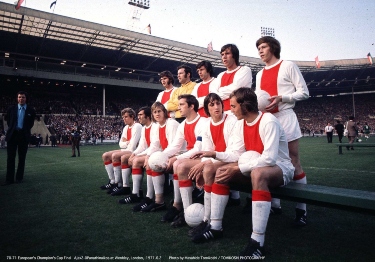Every football fan knows about Ajax and their historical prowess, from the seventies dream team of Cruyff, Neeskens and co, to the class of 95’ with Rijkaard, Overmars and Edwin van der Sar. The Amsterdammers have won a staggering 75 trophies since their conception in 1900, including 35 Eredivisie Titles, 20 Dutch Cups, and 4 European Cups/Champions League Titles.
Paving the way
Ajax got its hands on silverware for the first time in the 1916-17 season, winning the KNVB Cup under Englishman Jack Reynolds; having just been promoted the season prior this was a great feat. Reynolds is accredited with essentially building the foundations of what is the Ajax of today. He was the first person to be considered as a ‘manager’ and birthed the idea of youth academies in the Netherlands. This was vital for the growth of the club, allowing players to integrate seamlessly into the first team.
The way Reynolds’ team played football was important to him. Thought of as one of the founding fathers of ‘Total Football’, Reynolds would tell his players to break the mould of yesteryear’s footballing style, passing long and short, moving freely into open spaces and player rotation rather than just relying on physicality -he also introduced wingers and inside forwards to the Dutch consciousness. Playing in such a way altered history and left the template for future managers. After three spells at the club, spanning twenty-four years Reynolds left Ajax in 1947 after winning eight league titles.
Culture
During the late 60s and into the 70s, The Netherlands experienced a national revolution and the epicentre was in Amsterdam. Migration was actively sought, which saw an influx of Spaniards, Italians, Turks, Moroccans and Surinamese enter the country, which subsequently led to diversification and a more open culture that ultimately infiltrated itself into football, seen by the style of football that was being played in the country.
In 1965 Rinus Michels, who played under Jack Reynolds as a striker, was appointed as Ajax manager, an appointment that changed the course of football. Considered a footballing pioneer by many, he was able to further the evolution of Total Football. Michels’ iteration of Total Football was reliant on versatility, spatial awareness and fluid movement in all areas of the pitch. 4-3-3 was the formation of choice, sometimes rotating into a 3-4-3 with the libero acting as a midfielder. These tactical nuances bred instant success as Ajax stole the Eredivisie title back from their Rotterdam rivals Feyenoord.
Total Football was brought to the eyes of the world in 1970. The 1970/71 season saw a youthful and exuberant side containing Ruud Krol, Johan Neeskens, Arie Haan, Johan Cruyff and Dick van Dijk conquer all put before them, winning their first European Cup and the KNVB Cup, beating Panathinaikos and Sparta Rotterdam respectively. Ajax won 11 trophies between 1970 and 1973 including three consecutive European Cups, three league titles and the UEFA Super Cup. Trophies were not the most important, but the way the trophies were won was most valuable to the club.
Legacy
No club has had more of an influence than Ajax in the history of Association Football. Arsène Wenger, Arrigo Sacchi, and especially Pep Guardiola have all spoken about Michels and Cruyff’s influence on them as managers. Cruyff handed Guardiola his debut for Barcelona and they would also speak with each other about tactical adjustments.
Barcelona hadn’t won the La Liga title for eleven years before the arrival of Rinus Michels in 1971. La Liga was considered a physical league, reflecting Spanish society during the late 60s and early 70s. He would oversee a multitude of changes, including the modernisation of the club, by creating training regimes for his players and teaching academy players his style of football. These changes created a shift in culture around the club which can be seen almost 50 years later. By the 1973-74 season, Barcelona had won their first La Liga title since 1960.
Ajax has made its contribution to football through managers, players and ideas. Throughout their history they have been able to provoke people into thought, producing unforgettable moments for multiple generations, and for that, the footballing world is eternally thankful.
Ajax (ˈeɪdʒæks) NOUN Greek mythology
Ajax the Lesser, a Locrian king, a swift-footed Greek hero of the Trojan War.

